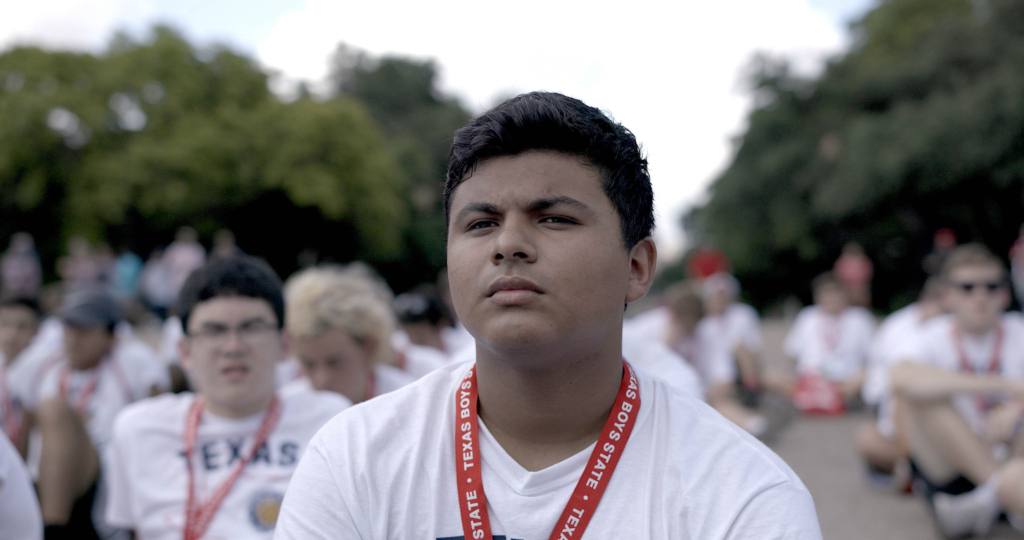

The progressive assumption about Generation Z’s political awakening after four years of Trump is that they would uproot the toxicity of old politics for good. Boys State offers a counter-revelation, taking viewers through a decades-old, highly competitive program where high school students partake in the treacherous mazes of government and emerge as shrewd figures. It’s surprisingly engaging but also unintentionally chilling when you see just how far some of these kids are willing to go to succeed.
As its title sequence reveals, the Boys State program has been around since 1935, a mock political boot camp that invites high school students of all ideologies to freely engage in civic discourse and campaign on issues. It’s clearly been effective, as among the high-profile alumni include Bill Clinton, Dick Cheney, and Corey Booker, to name a few.
Yet this ambition is juxtaposed against an opening quote by George Washington warning about the dangers of political parties, something mirrored by a Texas school teacher asking his students in the opening scene whether internet culture has kneecapped sustained dialogue. He discusses this like a cautionary tale, invoking the dystopian fears of George Orwell and Aldous Huxley, but for the young men attending the 2018 Texas Boys State program, social media is just another tool for mastering 21st-century politics.
Realistically, directors Jesse Moss and Amanda McBaine can’t offer a full-throated interview of more than 1000 young Texans. Instead, they limit their focus to four students involved in the campaign for Boys State governor, with the Federalist and Nationalist party competing for a base of undecided student voters. Each profiled participant is politically savvy in his own way. All try to best promote various ideologies with shades of conservative buzzwords thrown into the mix. It’s like watching a role-playing game, only the topic is politics and some participants are way too eager to play the bad guy without a sense of irony.
Ideologically, the student body parallels the behavioral archetypes of Democratic and Republican candidates. René Otero leads the Nationalist party as state chairman, playing to the crowd’s subconscious desire for bipartisanship even as a loud minority demand nonsensical floor votes rather than take matters seriously. He’s working with Steven Garza, a Sanders-inspired progressive who likes finding common ground with voters and regularly uses his mom’s immigrant backstory to reveal that he too believes in the promise of America.
Opposing them is Ben Feinstein, a proud Reagan conservative who rejects the identity politics message out of his personal experience as a bilateral amputee. He oversees the Federalist message by deploying maneuvers to disrupt nationalist leadership—no matter how unethical or fabricated the smears—because they work. The underlying idea is if politics is a zero-sum game, you have to use every tool available to achieve your victory.
The wildcard is Robert MacDougall, Steven’s gubernatorial rival who first comes across as a frat boy type with a Keanu Reeves Bill & Ted drawl. Where Steven speaks on serious issues, Robert embraces abstract political jargon about pro-life and pro-gun stances aimed straight at the conservative id. If this sounds pandering, that’s because it is. As Robert later reveals in an interview segment, he’s actually pro-choice but chooses to speak the language of this particular Texan majority because that’s how you win their approval. It’s a self-aware moment that highlights how entrenched political parties cater to location rather than ideology, implying that even a mock scenario must adhere to partisan divides to get enough applause.
Boys State takes us through all the steps of this campaign, from the stump speeches to the unethical mudslinging tactics shared through social media. Ben in particular proves adept at channeling his inner Fox News skills, such as using Steven’s March for Our Lives participation to drive a wedge on 2nd Amendment issues. Considering how everyone is in their teens, these actions raise a question of whether the Boys State program’s goal of teaching politics is the same as teaching moral responsibility. Civic discourse is needed for democracy’s survival, of course, but what happens if the youth embrace divisiveness rather than discourse? To paraphrase René, it makes that person a good politician, and he doesn’t mean that as a compliment.
Make no mistake though: Boys State’s machinations will keep you hooked, even if the stakes are literally non-existent. The program’s main goal is to find the next generation of political leadership and test their skills. My question is whether the participants will use their abilities to promote a more forward-thinking tomorrow or become your standard politician?






Leave A Comment